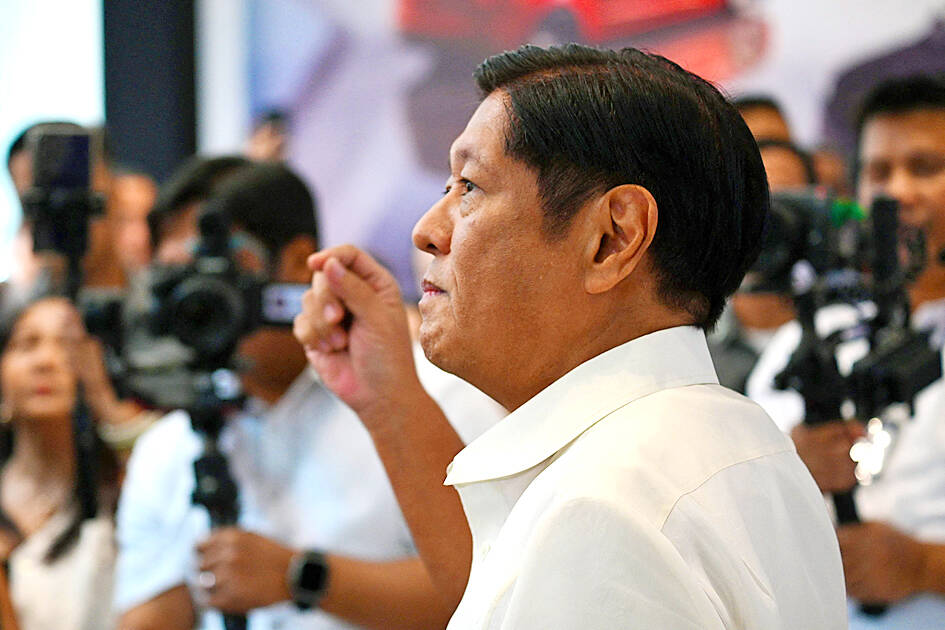Philippine President Ferdinand Marcos Jr yesterday thanked Cambodian King Norodom Sihamoni for granting a royal pardon last year to 13 Filipino women who were convicted of illegally serving as surrogate mothers in the Southeast Asian kingdom.
Marcos expressed his gratitude in a meeting with Cambodian Prime Minister Hun Manet, who was visiting Manila for talks on expanding trade, agricultural, tourism, cultural and security relations.
The Philippines and Cambodia belong to the 10-nation ASEAN, a regional bloc that promotes economic integration but is divided on other issues, including countries whose security alignments is with the US or China.

Photo: AFP
Marcos has strengthened his country’s treaty alliance with the US to boost the Philippines’ external defense as it confronts China’s increasingly aggressive actions in the disputed South China Sea. Cambodia has long been known as a key backer of China in the region.
The 13 Filipino women were convicted in December last year in Cambodia on human trafficking-related charges for acting as surrogates for a criminal syndicate selling babies to foreigners for cash.
The women, who were in various stages of pregnancy, were each sentenced to four years in prison by a Cambodian court, but they avoided imprisonment and were instead flown back to the Philippines under a royal pardon granted by Sihamoni.
“We will never forget this act of magnanimity from His Majesty, a testament to the strong relations between our two countries,” Marcos said before a closed-door meeting with the Cambodian prime minister and his delegation in Manila.
“We will continue to stand with you in the fight against transnational crimes and their adverse effects on our peoples and on our communities,” Marcos said.
The Filipino women were charged for contravening a Cambodian law against human trafficking and sexual exploitation which was updated in 2016 to ban commercial surrogacy. Cambodia has become a popular destination for foreigners seeking women to give birth to their children.
It has a bad reputation for human trafficking, especially in connection with online scams in which illegally recruited foreigners work under conditions of virtual slavery and help perpetrate online criminal fraud that victimize citizens in other countries.
Several agreements were signed after Hun Manet’s meeting with Marcos, mostly aimed at boosting trade, investment, tourism and agricultural engagements. One agreement aims to prevent looting and illicit trafficking of cultural artifacts.

ANGER: A video shared online showed residents in a neighborhood confronting the national security minister, attempting to drag her toward floodwaters Argentina’s port city of Bahia Blanca has been “destroyed” after being pummeled by a year’s worth of rain in a matter of hours, killing 13 and driving hundreds from their homes, authorities said on Saturday. Two young girls — reportedly aged four and one — were missing after possibly being swept away by floodwaters in the wake of Friday’s storm. The deluge left hospital rooms underwater, turned neighborhoods into islands and cut electricity to swaths of the city. Argentine Minister of National Security Patricia Bullrich said Bahia Blanca was “destroyed.” The death toll rose to 13 on Saturday, up from 10 on Friday, authorities

DEBT BREAK: Friedrich Merz has vowed to do ‘whatever it takes’ to free up more money for defense and infrastructure at a time of growing geopolitical uncertainty Germany’s likely next leader Friedrich Merz was set yesterday to defend his unprecedented plans to massively ramp up defense and infrastructure spending in the Bundestag as lawmakers begin debating the proposals. Merz unveiled the plans last week, vowing his center-right Christian Democratic Union (CDU)/Christian Social Union (CSU) bloc and the center-left Social Democratic Party (SPD) — in talks to form a coalition after last month’s elections — would quickly push them through before the end of the current legislature. Fraying Europe-US ties under US President Donald Trump have fueled calls for Germany, long dependent on the US security umbrella, to quickly

Local officials from Russia’s ruling party have caused controversy by presenting mothers of soldiers killed in Ukraine with gifts of meat grinders, an appliance widely used to describe Russia’s brutal tactics on the front line. The United Russia party in the northern Murmansk region posted photographs on social media showing officials smiling as they visited bereaved mothers with gifts of flowers and boxed meat grinders for International Women’s Day on Saturday, which is widely celebrated in Russia. The post included a message thanking the “dear moms” for their “strength of spirit and the love you put into bringing up your sons.” It

In front of a secluded temple in southwestern China, Duan Ruru skillfully executes a series of chops and strikes, practicing kung fu techniques she has spent a decade mastering. Chinese martial arts have long been considered a male-dominated sphere, but a cohort of Generation Z women like Duan is challenging that assumption and generating publicity for their particular school of kung fu. “Since I was little, I’ve had a love for martial arts... I thought that girls learning martial arts was super swaggy,” Duan, 23, said. The ancient Emei school where she trains in the mountains of China’s Sichuan Province